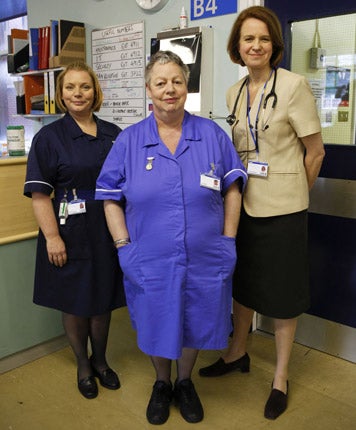Harry and Paul, BBC2, Tuesday<br/>Getting On, BBC4, Tuesday<br/>Horizon, BBC2, Monday
Enfield and Whitehouse are throwbacks, Jo Brand feels here-and-now, and Horizon offers future hope

As if scheduled to prove that television comedy is as prone to the winds of fashion as any falling or rising hem, I found myself staring, misty-eyed, at Harry and Paul last week.
Hadn't meant to, but there it was – plonked in the BBC2 schedules on Tuesday, like coming across that old burgundy leather skinny tie in your wardrobe.
As with every unexpected moment of nostalgia, there were a few fond memories, and plenty to cringe at. The sketch in which Harry Enfield translated, dead pan, on behalf of Paul Whitehouse's lascivious Italian politician (think Sylvio Berlusconi gurning on Viagra) reminded you of the pair's Nineties pomp: broad, physical, confident. "Parking Patawayo" was anything but – a crude swipe at African parking attendants, in the style of Postman Pat but, alas, not quite as amusing as Postman Pat.
By contrast, Getting On, then, was the equivalent of the hipster plaid shirt, a comedy unmistakably cut from early 21st century cloth. The wobbly camerawork, as if shot by a team of four-year-olds who have run off with the digicam; the mournfully drab municipal setting; the absence, God forbid, of a laugh track; the studiedly natural dialogue. The Office begat The Thick Of It which begat this, a downbeat comedy set on an anonymous NHS ward. It came as no surprise that this, the first episode of the second series (I've come to it late), was directed by Peter Capaldi and starred Joanna Scanlan – each a first-class honours graduate of the Armando Iannucci school of comedy.
And this, being the series opener, it was appropriate that this most self-effacing of entertainments kept the action to the bare minimum. An unconscious old homeless person was admitted whom neither Nurse Den Flixter (Joanna Scanlan) nor her underling Kim Wilde (Jo Brand) really wanted to deal with. A little later, a woman visited her ailing mother and challenges Dr Pippa Moore (Vicki Pepperdine) about the level of pain relief available. That was it. The comedy, such as it was, peeped out from the fraught exchanges between Den, Dr Moore and the male Matron Hilary (Ricky Grover) as they tussled for the upper hand among the dank beds and grey windows. Kim meanwhile rolled her eyes and tried to keep out of trouble.
Yet, days later, it's not the comedy that stays with you, but the show's portrait of the NHS in miniature. Brand, Pepperdine and Scanlan are co-writers, and one assumes Brand's early career as a psychiatric nurse keeps the tone right, if not the up-to-the-minute detail. The passage of the homeless woman from Kim and Den, to the reluctant care of a junior house officer, to the corridor as they try to offload her on another ward was as understandable as it was distressing. Similarly, a well-informed woman's request that her mother's meds be amped up wasn't so much wryly amusing as it was useful – so that, you thought, is how you get someone to pay you proper attention: bone up on the internet, be endlessly polite and don't let them off the hook.
Horizon embraced a similar scenario for "Miracle Cure? A Decade of the Human Genome". Three patients stood before the boffins of genetic research and asked them when their work was going to make a difference to the patients' lives.
Sophie, a 23-year-old teacher with cystic fibrosis, wondered if gene therapy would beat the all too literal deadline she faces, a life expectancy of 38. Emma had by her early thirties already survived three bouts of the cancer that had killed her mother and grandmother, yet clung to the hope that genetically developed targeted cancer therapy might improve not just her chances but those of her year-old son. Finally, there was Tom, 36, a recovering alcoholic hoping someone could tell him the degree to which his demons were nature or nurture.
The other stars of the show were the lab mice: glowing or drunk or merely anaesthetised.
But genetic research being as dry as it is, the programme made the simple, clear-headed decision to put patient in front of researcher and let their qualities show: the patients controlled their emotions and asked intelligent questions, the researchers answered, then ditched their bedside manner and reached out.

Watch Apple TV+ free for 7 day
New subscribers only. £8.99/mo. after free trial. Plan auto-renews until cancelled.
ADVERTISEMENT. If you sign up to this service we will earn commission. This revenue helps to fund journalism across The Independent.

Watch Apple TV+ free for 7 day
New subscribers only. £8.99/mo. after free trial. Plan auto-renews until cancelled.
ADVERTISEMENT. If you sign up to this service we will earn commission. This revenue helps to fund journalism across The Independent.
In particular, the moment when Emma realised with joy that targeted cancer therapy might well benefit her son, the tearful embrace with a cancer researcher was coloured by the silent inferrence that this therapy may well arrive far too later for her.
It seems some emotions never go out of fashion.
Join our commenting forum
Join thought-provoking conversations, follow other Independent readers and see their replies
Comments